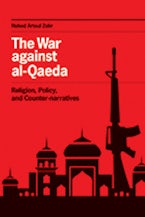- Home
- political science
- religion
- The War against al-Qaeda

The War against al-Qaeda
Religion, Policy, and Counter-narratives
232 Pages
- Paperback
- ISBN: 9781626164284
- Published By: Georgetown University Press
- Published: April 2017
$64.95
Nahed Artoul Zehr’s The War against al-Qaeda: Religion, Policy, and Counter-Narratives attempts to interpret militant Islam and help American policy makers consider their approaches to the threat.
Zehr begins her book by critiquing both counterinsurgency and counterterrorism strategies, which the United States uses against al-Qaeda and related groups, from the lens of just war theory. The Christian tradition of just war theory provides constraints on both the initial decision to go to war as well as the conduct of war. From her perspective, neither a counterinsurgency nor counterterrorism strategy against al-Qaeda meets the various criteria of a just war. For instance, the improbability of success by means of a counterinsurgency strategy in Afghanistan fails to meet the just war criteria of “the overall good anticipated by resorting to force [must] be greater than the expected harm” (28).
After explaining how both counterinsurgency and counterterrorism are not within the bounds of a just war approach towards al-Qaeda, Zehr turns her attention to Islam itself. Looking at the history of Islam, she explains how certain constraints in warfare, similar to those within the Christian just war tradition, developed over time. She then provides an intellectual history of al-Qaeda and demonstrates how the writings of Muhammad abd-al-Salam Faraj, Sheikh Azzam, and Osama bin Laden erode these constraints, particularly the distinction between combatants and non-combatants. The writings of Abu Musab al-Suri, who developed a model of warfare encouraging “lone-wolf” terrorist attacks, demanding that “all Muslims wherever they may be” rise up and fight against the crusaders (117, italics original), is the final step in this devolution of boundaries.
After showing some examples of how individuals and groups such as ISIS have applied al-Suri’s thought, Zehr then looks at contemporary Muslim debates about establishing the state and the validity of using of force to do so. She provides examples of two approaches, the modernists (such as Abou El Fadl, who claims that an Islamic state is unnecessary) and the traditionalists (such as Yusuf al-Qaradawi, who claims that an Islamic state should be established). Although she suggests that the traditionalists have greater support within the Muslim world, both groups contest the militant version of Islam espoused by al-Qaeda.
The final chapter of The War against Al-Qaeda looks at counter-narratives, which she defines as “the attempt to delegitimize, deflate, disrupt, destroy, and dismantle the al-Qaeda narrative” (174). Zehr sharply criticizes US involvement in counter-narratives, which have to date entailed inappropriate government intervention “in a set of theological issues.” Not only does the government lack “personnel with the appropriate training…to ‘categorize’ Muslims,” but counter-narrative efforts tend to inadvertently reinforce militants’ narratives (189-90). A combination of careful strategic messages and dialogue is the optimal solution: “All of us must be willing to come to the table with the understanding that if we seek resolution, then we must be prepared to have our assumptions challenged” (194). Understanding that al-Qaeda’s message is already being undermined in the Muslim world—as well as the nature of American church-state relations—means that a light touch is required on the part of the government when facing issues that are religious in nature.
The major weakness in this book is that Zehr tries to do too much. In 200 pages, she tackles the historical development of just war theory in two religious traditions, the military strategies of counterinsurgency and counterterrorism, the intellectual history of al-Qaeda and related Islamic groups, contemporary debates in Islam about the state and international relations, and US government interactions with Muslims. Individual chapters and topics lack depth. For instance, it appears that Zehr believes that counterterrorism, as a strategy, is wholly based on the use of drone strikes (32-44). Zehr never acknowledges that counterterrorism operations are far more complex than the use of drones, and include targeting financial networks, disrupting human trafficking syndicates, undertaking cyber operations, ordinary police work, and military force. All of these approaches have their own challenges and drawbacks, but the fact that Zehr does not look beyond drone strikes suggests a misunderstanding of counterterrorism as a strategy. Furthermore, while counterinsurgency and counterterrorism are different military approaches, they are not mutually exclusive and can complement each other when used properly, as during the Iraq Surge.
My other concern with Zehr’s work is that she claims that matters pertaining to Islam must be left outside of the US government’s purview. Her understanding of mosque-state relations places all the limitations on the state, and never factors in the obligations of individual citizens in a liberal democracy. Zehr writes that “American decision makers cannot condone, support, or foster one vision of Islam over another regardless of how much more amenable ‘moderate Muslim networks’ or ‘civil democratic Islam’ may be to US policy interests and to the interests of the international community” (182). I disagree. Matters get complicated when the state interacts with religious groups (whether comprised of citizens or non-citizens), but Zehr’s solution entails having the state withdraw from anything related to Islam, since all issues pertaining to Muslims are theological in nature (189). Yet it seems reasonable in principle for a state to determine that certain actors are behaving in ways amenable or inimical to its interests. The Establishment Clause of the First Amendment does not mean that the American state cannot constrain the behavior of a religious group that acts in ways harmful to the state, simply because it is a religious group. Zehr’s argument creates a uniquely privileged place for Islam within America and outside of America as well, and would be equally problematic (perhaps more so) if it were applied or appropriated by other religious groups in America.
It is also troubling that Zehr never discusses Muslim obligations to the state itself. These are, of course, the same as those of every other citizen, at least in the United States, with the fundamental implicit agreement being that some areas of one’s personal life, regardless of one’s convictions, must fall under the state’s authority. Andrew March’s Islam and Liberal Citizenship: The Search for an Overlapping Consensus (Oxford University Press, 2009), not cited by Zehr, is a thoughtful approach towards some of the obligations of Muslims who live in a non-Muslim democracy. March shows that some contemporary Muslims’ understandings of da’wa (Islamic mission) have superseded the debate over whether Muslims’ basic relationship with non-believers should be either war or peace. Da’wa provides a source of moral obligation that recognizes non-Muslims’ moral personalities and demands “an open-ended commitment to…non-coercive moral persuasion” from Muslims who interact with non-Muslims (270). Such an understanding leads to mutual respect between Muslim citizens and a secular government, and is a stronger foundation for healthy mosque-state relations than the wall of separation posited by Zehr. And developing a relationship of mutual respect on the part of both the US government and its Muslim citizens could do more in the long run to undermine al-Qaeda’s narratives than any direct campaign of the US government.
Major Brandon Colas is assistant professor of international affairs at the United States Military Academy at West Point.
The views in this review are those of Major Colas and do not represent the Department of Defense, the United States Army, or the United States Military Academy.
Brandon ColasDate Of Review:September 8, 2017
Nahed Artoul Zehr is the executive director of the Faith & Culture Center in Nashville, Tennessee. In 2011-2012 she was Minerva Research Chair at the United States Naval War College.











